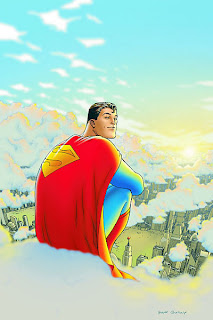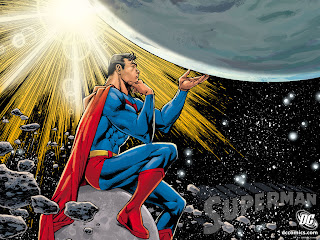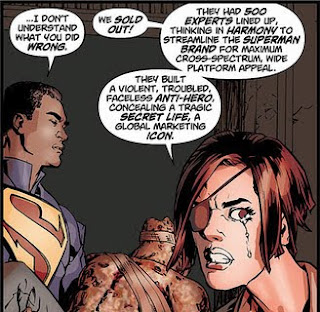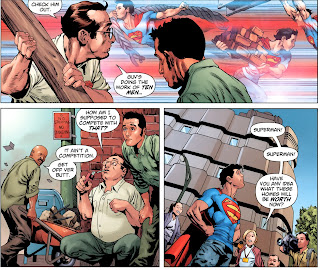Skip to comments.
Superman: Dying For Our Sins?
50 Reasons I Should Not Write Comics ^
| October 8, 2012
| Astro
Posted on 10/09/2012 9:51:59 PM PDT by Bratch
Superman: Dying For Our Sins?
On a pop culture icon’s decreasing popularity
Do you believe a man can fly?
Once, they made us believe. In comic books, in cartoons, on film, on television, through radio they told the tales of, as Alan Moore put it, a perfect man who came from the sky and did only good. Like a modern myth he came from the frenzied imagination of not just two young men from New York, but from the cobbled together hopes and dreams and fears and sublimations of an entire generation of kids and adults, from every creator who worked on him and fans who saw in him their hopes leap tall buildings, their intractable fears bend like rubber.
But over the years, that great sun god has lost a bit of his shine. The four color comic book sky has grown cloudy and crowded, and while Superman’s status as a widely known icon is without question, his popularity within the medium that birthed him has waned; if the relative failure of his last movie is to be believed, he may have lost some of his mass appeal, too.
The question, then, is…why?
Recently (and by recently I mean within the last year or so), there have been a litany of articles expounding on this notion of Superman as a broken icon, a relic of a lost age with little relevance to the modern man (or woman), perhaps even hopelessly so. A few have focused on Grant Morrison’s relaunch of the character as, fundamentally, a failure for being too radical a departure (a stance that couldn’t be more incorrect in this blogger’s estimation). I think there are a number of barriers to Superman gaining widespread, continued popularity, rather than recognizability. It is not one thing or the other, but everything at once.

It is, perhaps, easy to blame the quality of the creators when you look at Superman’s decline. And certainly that is PART of the problem, at least in certain cases, but it’s the natural symptom of a more fundamental disease, one that stems from the very mentality of the readership, and the culture. After all, there is a pervasive sense of “He’s HOKEY” from those who have never picked up a Superman comic in their life, having had only tangential exposure to the character.
There can be little doubt that Superman is much more the cultural icon than any comic book character save, perhaps, Batman. Looking across all demographics, it’s hard to imagine an individual who at least wouldn’t recognize the iconography. And yet, within the medium itself, rarely has Superman been at the top of the heap (though the New 52 changed a lot of that, at least temporarily). Why?

The chief difference between Superman and the 'preferred' characters such as Batman, Spider-Man, Wolverine, etc is that they represent a very resonant, albeit hyper-expressed, angst. Angst, for all the hate it gets on message boards, is a simple, immature emotion that most of the comic buying public has experience with. Insofar as these characters are power fantasies, a large segment of the readership is looking to lose itself in these stories by imagining THEMSELVES as the characters; as we all have flaws, sometimes serious flaws, it’s easier to identify with a troubled, conflicted individual than it is a paragon of virtue. Superman used to serve this function, in part, via the "Clark Kent" persona experiencing ridicule, only to transform into the perfect "Superman" identity; but that was very much lost (and somewhat hard to suspend disbelief over, for an older, less imaginative audience) over the years. Captain Marvel outsold Superman because he went a step further -- he was a kid that transformed into an all powerful adult! Kids went crazy for it, because it more closely represented them. Batman became more popular when Robin - one of them! - was inserted into the mythos.
Characters like Spider Man and Wolverine and the Batman we've all come to know more fully embody the, frankly, childish emotional upheavals we’ve all dealt with, especially the more emotionally and intellectually stunted among us (which isn’t to say only the emotionally and intellectual stunted prefer Wolverine to Superman, just that there is an easier ‘in’ to the character).

Superman, at his core, is a mythological figure much more than he is a character. The stories told about him SHOULD represent the struggles we all deal with -- allegorically. Superman stories are about the absolute wonder that exists everywhere, an infinity of possibility. Superman feels lonely -- so he goes through time and makes friends with the Legion of Super-Heroes. The emotions he feels transcend angst and pettiness, cross into the realm of faith. They are of a higher order, and when you're writing the character you have to play only to those higher order emotions; largely removing jealousy, anger, self hatred, fear, whineyness, arrogance, and all the other negative emotions that make great drama, and are the bulk of a modern writers' repertoire.
Superman is bigger than all that. There must be a poetry in everything he does, his every action an act of art. The suchness of worldly things, each molecule an orchid, every atom a pearl; this is his religion, this is the world as Superman sees it, as we all might. Superman stories are PARABLES, instructive in their tone, constructive in their direction. You make do with what you have, you confront your challenges head on, knowing that a brighter future awaits, where things will get better and you’ll have all the friends you could ever want, and they’ll be the coolest friends in all the universe.
And it’s hard to get on board with that, honestly, and it's hard to do that well for the modern audience. It takes an incredible creativity, an incredible skill with words and pictures to make that work for the disaffected teens and adults of today, I think.
 |
| Grant Morrison gives a definitive statement on this cultural angst in just a few panels |
To a populace who would rather not think of all the ways in which we are broken, or failing to live up to our ethical potential, Superman reminds us; a being of pure good, self assuredly doing what he can to save the world without complaint and without hesitation. Couldn't we all be that way? And if so, why aren't we?
Superman makes us UNCOMFORTABLE. Superman makes us ASHAMED of our laziness, of the small compromises we make every day, the transgressions we commit against what we know to be right in the name of expediency, convenience, greed, pettiness, anger.
So, I submit to you, dear reader; perhaps the problem isn’t with Superman. Perhaps the problem with us.
Because it wasn’t always that way, was it? There was a time, for each of us, when ideas and ideals were no less tangible for their purity. When the totemic power of an “S” or a Bat enlivened the heroes within us, even if only for an hour, even if only inside our own heads. Was it that, in an effort to grow up and put away childish things, we put away the things that made us great? Are we so very broken that goodness inspires us not to rise to the challenge and to the occasion, but turn our heads in scorn, or bow them in shame? Has the realization that all real world heroes have feet of clay made it impossible for us to feel the electric thrill of platonic ideals given form and animus?

Like some ancient greek warrior, kissing his spear and believing he might be channeling Ares, Superman’s SYMBOL imbued us as children with an unmatched power; the power to be what we knew to be best would COULD be. It’s the kind of primal understanding and acceptance that we, in our more ‘enlightened’ ages, tend to eschew as simplistic, anachronistic, childishly trusting and facile. It is FAITH, a secular faith in a secular humanism, and it’s something that many today are incapable of engaging in.
But as destructive as blind faith can be, faith can be incredibly powerful, and it can be the act of an incredibly courageous, enlightened mind. And I can’t help but wonder if we wouldn’t all be a little better off if we didn’t need to see the worst in us to be able to see the best.
So I ask again:
Do you believe a man can fly?
Do you want to?
TOPICS: Books/Literature; Chit/Chat; Society; TV/Movies
KEYWORDS: angst; icon; superman
Comment #1 Removed by Moderator
To: Bratch
More people have read this response than your blog.
2
posted on
10/09/2012 10:02:19 PM PDT
by
Tzimisce
(THIS SUCKS)
To: Bratch
To the premise: Hell no
There is only One who can die for my sins and its not superman.
(No, I did not read the whole article.)
3
posted on
10/09/2012 10:14:49 PM PDT
by
svcw
(Why is one cell on another planet considered life, and in the womb it is not.)
To: svcw
Superman is not symbolic of Christ. Jerry Siegel and Joe Schuster were fairly clear that he was modeled after Moses.
4
posted on
10/09/2012 10:19:20 PM PDT
by
Jonty30
(What Islam and secularism have in common is that they are both death cults.)
To: Bratch
5
posted on
10/09/2012 10:23:22 PM PDT
by
webheart
(King of the Run-On Sentence)
To: svcw
I believe the author's premise is closer to "dying
BECAUSE of our sins".
There was a time, for each of us, when ideas and ideals were no less tangible for their purity. [...]
Was it that, in an effort to grow up and put away childish things, we put away the things that made us great? Are we so very broken that goodness inspires us not to rise to the challenge and to the occasion, but turn our heads in scorn, or bow them in shame? Has the realization that all real world heroes have feet of clay made it impossible for us to feel the electric thrill of platonic ideals given form and animus?
6
posted on
10/09/2012 10:25:24 PM PDT
by
Bratch
To: Tzimisce; Bratch
No, the problem with superman is that he is portrayed as having every super power. No frailties except the kryptonite piece, which doesn't even make sense in comic-book logic.
Also, quite frankly the convoluted story lines in comic books mean that most don't get immersed into it.
7
posted on
10/10/2012 12:53:48 AM PDT
by
Cronos
(**Marriage is about commitment, cohabitation is about convenience.**)
Comment #8 Removed by Moderator
To: Cronos
The problem with Superman is that he is a character that ultimately appeals to kids, or the kid inside of us. However, about 30 years ago, DC comics decided to stop writing the comic for kids and, instead, appeal to a shrinking group of adult male collectors.
To: Cronos
Having every super-power is not the problem, for Superman, as the interest is not really about him lifting a car, or having heat rays come out of his eyes.
It’s about him being so capable and having to make choices as to why he would save somebody and why he would not. It’s the philosophical arguements that make his comic book interesting, not the feats.
10
posted on
10/10/2012 4:39:26 AM PDT
by
Jonty30
(What Islam and secularism have in common is that they are both death cults.)
Disclaimer:
Opinions posted on Free Republic are those of the individual
posters and do not necessarily represent the opinion of Free Republic or its
management. All materials posted herein are protected by copyright law and the
exemption for fair use of copyrighted works.
FreeRepublic.com is powered by software copyright 2000-2008 John Robinson

